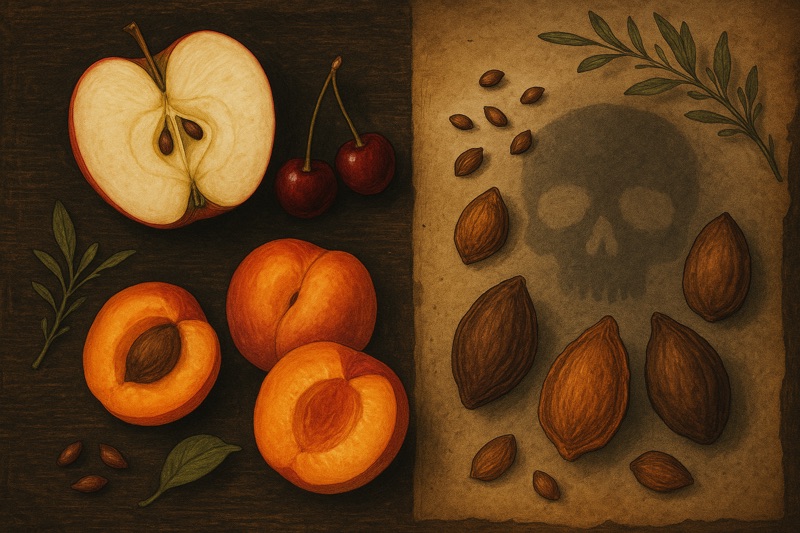Apple Seeds & Stone Fruit Pits: What You Really Need to Know
Most of us grew up being told, “Don’t eat the seeds!” when biting into an apple or cherry. There’s truth behind that advice, but the reality is a little more nuanced. Let’s take a closer look at why seeds and pits have a reputation for being toxic, how much is actually dangerous, and what you need to know to enjoy your fruit safely.
The Hidden Toxin: Amygdalin
Seeds and pits from apples, cherries, peaches, plums, apricots, and similar fruits contain a compound called amygdalin. On its own, amygdalin isn’t harmful, but when seeds are chewed, ground, or crushed, it breaks down in the body and releases hydrogen cyanide.
Cyanide prevents your cells from using oxygen properly, which is why it’s so dangerous in high doses. Symptoms of cyanide poisoning can include dizziness, headaches, confusion, and in extreme cases, collapse.
How Much is Too Much?
Here’s the reassuring part: the dose makes the poison.
- Accidentally swallowing a seed or pit? No problem. The hard shell protects you, and it will usually pass through without releasing toxins.
- Chewing seeds or cracking open pits? That’s where risk increases.
- A single apple seed may release about 0.6 mg of cyanide if fully chewed.
- It takes dozens to hundreds of apple seeds (chewed) to reach a dangerous dose for an adult.
- Stone fruit pits, like apricots or cherries, pack a stronger punch. Bitter apricot kernels in particular have caused real poisonings when eaten in handfuls.
Children and pets are more vulnerable, so it’s especially important to keep pits away from curious little hands and paws.
Safe to Eat: The Fruit Itself
Rest easy—the flesh of apples, cherries, peaches, plums, and apricots is completely safe. The toxin is concentrated in the seed, not the juicy part we love.
A few practical notes:
- Don’t crush seeds/pits to make teas, oils, or remedies unless they’ve been commercially processed (and certified safe).
- Cooking and baking reduces but doesn’t completely remove amygdalin. That’s why bitter almond extract is carefully treated before being sold.
- Avoid letting pets chew pits—animals can be even more sensitive than we are.
A Fruit-by-Fruit Snapshot
- Apples: Seeds contain amygdalin, but you’d need to chew 150+ seeds to risk real harm.
- Cherries: Pits hold cyanide; don’t chew them. Swallowing one whole is harmless.
- Peaches & Plums: Similar to cherries. The pit is toxic inside, but the fruit is safe.
- Apricots: Apricot kernels are the most dangerous and have been linked to poisonings.
A Note of Perspective
Yes, seeds and pits can be toxic in large, prepared, or chewed amounts—but cyanide poisoning from fruit seeds is very rare. You’d have to go out of your way to make yourself sick. For everyday eating, you can enjoy your fruit without worry.
So the old advice holds true: eat the fruit, toss the seeds.
✨ Bottom Line:
- Accidental seed swallowing: Harmless.
- Chewing/crushing seeds or pits: Risky in large amounts.
- Fruit flesh: Always safe and nourishing.
Next time someone warns you about apple seeds or cherry pits, you’ll know the full story—and you can enjoy your fruit with peace of mind. 🍎🍒🍑

Sources & References
- Agency for Toxic Substances and Disease Registry (ATSDR). Toxicological Profile for Cyanide. U.S. Department of Health & Human Services.
https://www.atsdr.cdc.gov/toxprofiles/tp8.pdf - Centers for Disease Control and Prevention (CDC). Facts About Cyanide.
https://emergency.cdc.gov/agent/cyanide/basics/facts.asp - European Food Safety Authority (EFSA). Scientific Opinion on the Risks for Human Health Related to the Presence of Cyanogenic Glycosides in Apricot Kernels. EFSA Journal, 2016.
https://doi.org/10.2903/j.efsa.2016.4424 - United States National Library of Medicine (MedlinePlus). Cyanide Poisoning.
https://medlineplus.gov/ency/article/002771.htm - Food Standards Australia New Zealand (FSANZ). Cyanogenic Glycosides in Stone Fruit Kernels and Other Foods.
https://www.foodstandards.gov.au - Healthline. “Is It Safe to Eat Apple Seeds?” (reviewed by registered dietitian). https://www.healthline.com/nutrition/apple-seeds
No comments:
Post a Comment